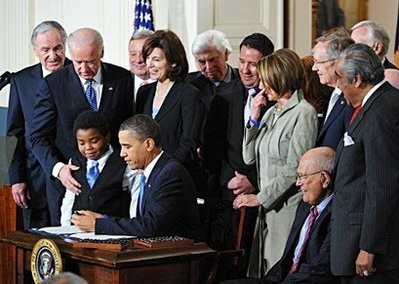WASHINGTON, March 24, 2010 (AFP) - President Barack Obama signed into law historic, sweeping reforms Tuesday that lay out health care coverage for almost every American and realize the dreams of generations of past US leaders.
"Today, after almost a century of trying, today after over a year of debate, today, after all the votes have been tallied, health insurance reform becomes law in the United States of America," Obama said.

"The bill I'm signing will set in motion reforms that generations of Americans have fought for and marched for and hungered to see," he told a jubilant, packed audience at a White House signing ceremony.
Delighted lawmakers and guests cheered as Obama made good on his campaign vow to overhaul America's embattled health care system, enacting a huge shift in US policy and the biggest social legislation in over four decades.
Meanwhile, the Senate began debate on a package of fixes sent by the House, with dozens of amendments to be proposed. Among the changes are canceling special agreements benefiting states like Nebraska and plans to fill the "donut hole" of Medicare health coverage for the elderly.
The House of Representatives narrowly approved the legislation that is now US law by 219-212 late Sunday, using the Democratic majority to muscle the measure through a united Republican opposition.
The 940-billion-dollar overhaul will extend coverage to some 32 million Americans who currently have none, ensuring 95 percent of under-65 US citizens and legal residents will have health insurance.
The historic signing came a century after president Theodore Roosevelt first called for a national approach to US health care, and after past leaders such as Bill Clinton tried and failed to reform the creaky, costly system.
For the first time ever, almost all Americans will be required to buy insurance or face fines. Among other key reforms, the new law bans insurance companies from denying coverage to people with pre-existing conditions, from dropping clients who get sick or from setting lifetime caps.
"You've made history," Vice President Joe Biden told a beaming Obama. "Mr President, you've done what generations of not just ordinary, but great men and women have attempted to do.
"You have turned, Mr President, the right of every American to have access to decent health care into reality for the first time in American history."
In the ceremonial East Room, where president Lyndon Johnson signed the civil rights bill into law in 1964, a party atmosphere prevailed as euphoric Democrats gathered to witness the act, sharing hugs and slapping palms.
Among them were Vicki and Caroline Kennedy, the widow and niece of the late senator Ted Kennedy, who struggled for almost five decades to enact health care reform, the cause of his life.
Obama used some 20 different pens to sign the 2,000-plus page bill, intending to give most of them to guests and key lawmakers and administration officials as souvenirs of the momentous occasion.
The Senate is taking up changes needed to their initial legislation. It is expected to approve them separately under rules that prevent Republicans from using a filibuster to indefinitely delay and kill the measure.
But Obama still has a hard sell defending the reforms ahead of the key congressional mid-term November elections, with Republicans throwing up their arms at a legislation they say is too costly.
"We've heard a lot today about how historic this bill is, and it's true," said Republican National Committee chairman Michael Steele in a statement. "It is an historic betrayal of the clear will of the American people. It is an historic loss of liberty."
House Republican Minority Leader John Boehner lamented "a somber day for the American people."
And Senate Minority Leader Mitch McConnell told CNN that "repeal and replace will be the slogan" for Republicans going forward.
Yet a USA Today/Gallup poll taken just after the bill's signing found that nearly half of Americans support the landmark health care overhaul, with 49 percent of respondents saying the bill was a "good thing," while 40 percent considered it a "bad thing."
On Thursday, Obama takes to the road, visiting Iowa for the first in a series of campaign-style events on the bill's behalf.
Overturning the plan is a mathematical impossibility in this election cycle as Republicans cannot win the two-thirds majority in the House and Senate needed to override Obama's veto.
But 14 states filed lawsuits against the legislation just moments after Obama signed the bill. Idaho and Virginia have already passed laws preventing their residents from being forced to buy insurance.
























